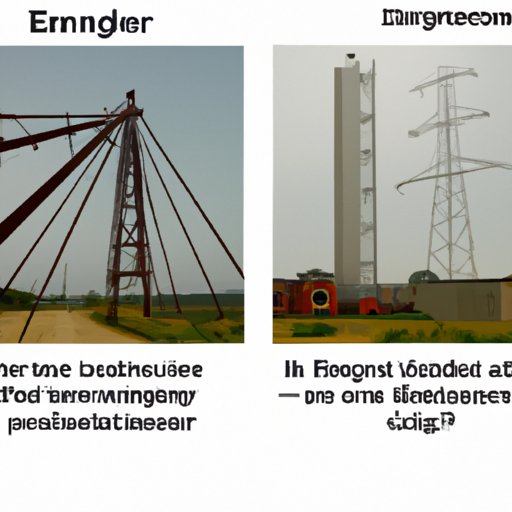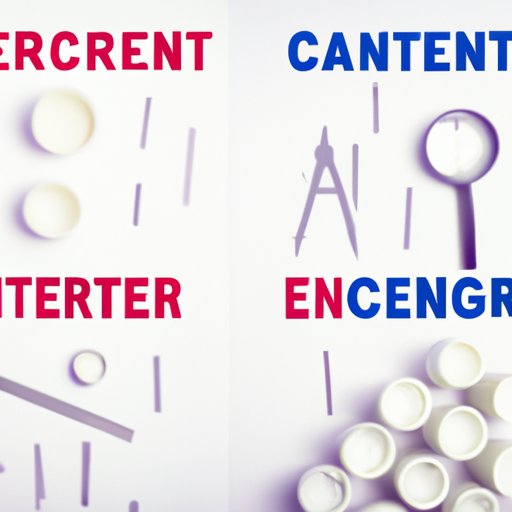Introduction
Engineering and science are two fields that often overlap and are frequently confused. But while they share some similarities, they also have distinct differences. To understand the distinctions between these disciplines, it is important to first define what each one entails.
Engineering is the application of scientific principles to solve practical problems. It involves the design, construction, and operation of machines, structures, and systems. Science, on the other hand, is the study of natural phenomena and the laws that govern them. It is a more theoretical approach to understanding the world around us.
The purpose of this article is to explore the differences between engineering and science. We will look at how the two disciplines compare, examining their respective processes, goals, and job opportunities. We will also discuss the unique aspects of each field, and how they can be used to benefit society.
Exploring the Distinction between Engineering and Science
The main difference between engineering and science lies in their approaches. Engineering is a practical field, focusing on problem-solving and the development of solutions. Science, by contrast, is more theoretical, exploring the underlying causes of phenomena and seeking to understand how they work. This distinction is best summed up by the following quote from Dr. Robert Noyce, co-founder of Intel Corporation: “Engineering is the closest thing to magic that exists in the world. You take something from theory, you make it real.”
The processes and goals of engineering and science are also different. Engineering focuses on creating tangible products and solutions, while science concentrates on understanding the natural world. In engineering, the goal is to create something that is useful for society. Scientists, on the other hand, are looking for knowledge and insight. They seek to explain why things happen and how they work.

A Comparison of Engineering and Science
Despite their differences, there are also several ways in which engineering and science are similar. Both involve critical thinking, analysis, and problem-solving skills. They both require an understanding of mathematics and physics, as well as the ability to think creatively. Additionally, both fields rely heavily on experimentation and testing to validate theories and develop new solutions.
At the same time, there are some unique aspects of each field. Engineering has a strong focus on design and construction, while science is mainly concerned with research and discovery. Engineers must also consider the economic and social impacts of their projects, while scientists are focused on expanding our understanding of the natural world.

How Engineering Differs from Science
When comparing engineering and science, it is important to look at the areas of focus for each discipline. Engineering is primarily concerned with creating practical solutions to real-world problems. This includes designing and building structures, machines, and systems. It also involves developing new technologies and improving existing ones.
Science, on the other hand, is more focused on exploration and discovery. It involves researching and studying the laws that govern the physical world. Scientists use experimentation and observation to uncover the hidden relationships between phenomena, and to gain a better understanding of how the universe works.

Examining the Unique Aspects of Engineering and Science
Both engineering and science offer many benefits to society. Engineering provides tangible solutions to everyday problems, while science reveals valuable insights into the workings of the natural world. They also both employ highly skilled professionals who are able to contribute to the advancement of technology and knowledge.
At the same time, each field has its own strengths and weaknesses. Engineering is better suited for short-term tasks, such as designing a structure or developing a new product. Science, on the other hand, is more effective for long-term projects, such as conducting research and making discoveries. Both disciplines also require different sets of skills, so it is important to consider which one best suits your interests and abilities.
Discovering the Contrasts between Engineering and Science
In addition to the different areas of focus, engineering and science also differ in terms of the technical skills required. Engineering requires a blend of mathematical, analytical, and creative skills, while science is more focused on research and data analysis. Engineers must also be familiar with the tools and techniques used in their field, while scientists must have a thorough understanding of the scientific method.
The educational requirements for each field are also quite different. Engineering typically requires a four-year degree in a related field, such as mechanical, civil, or electrical engineering. Science, however, often requires a master’s or doctoral degree in order to pursue a career in the field.
The Variations between Engineering and Science
The job opportunities available in each field also vary greatly. Engineering offers a wide range of positions, from entry-level roles in manufacturing to advanced positions in research and development. Science, on the other hand, is largely focused on academia and research. There are some jobs in industry, but they are usually limited to managerial and executive positions.
In terms of career advancement, engineers tend to have more options than scientists. Many engineers go on to become managers and executives, while most scientists remain in research or teaching positions. The pay scales for each profession also differ, with engineers typically earning higher salaries than scientists.
Conclusion
In conclusion, engineering and science are two distinct fields that share some similarities, but also have many differences. Engineering is focused on solving practical problems and creating tangible solutions, while science is more focused on understanding the natural world. Each field requires different skills and educational requirements, and offers different job opportunities and career paths. By understanding the key distinctions between engineering and science, it is easier to decide which one best suits your interests and abilities.
(Note: Is this article not meeting your expectations? Do you have knowledge or insights to share? Unlock new opportunities and expand your reach by joining our authors team. Click Registration to join us and share your expertise with our readers.)
